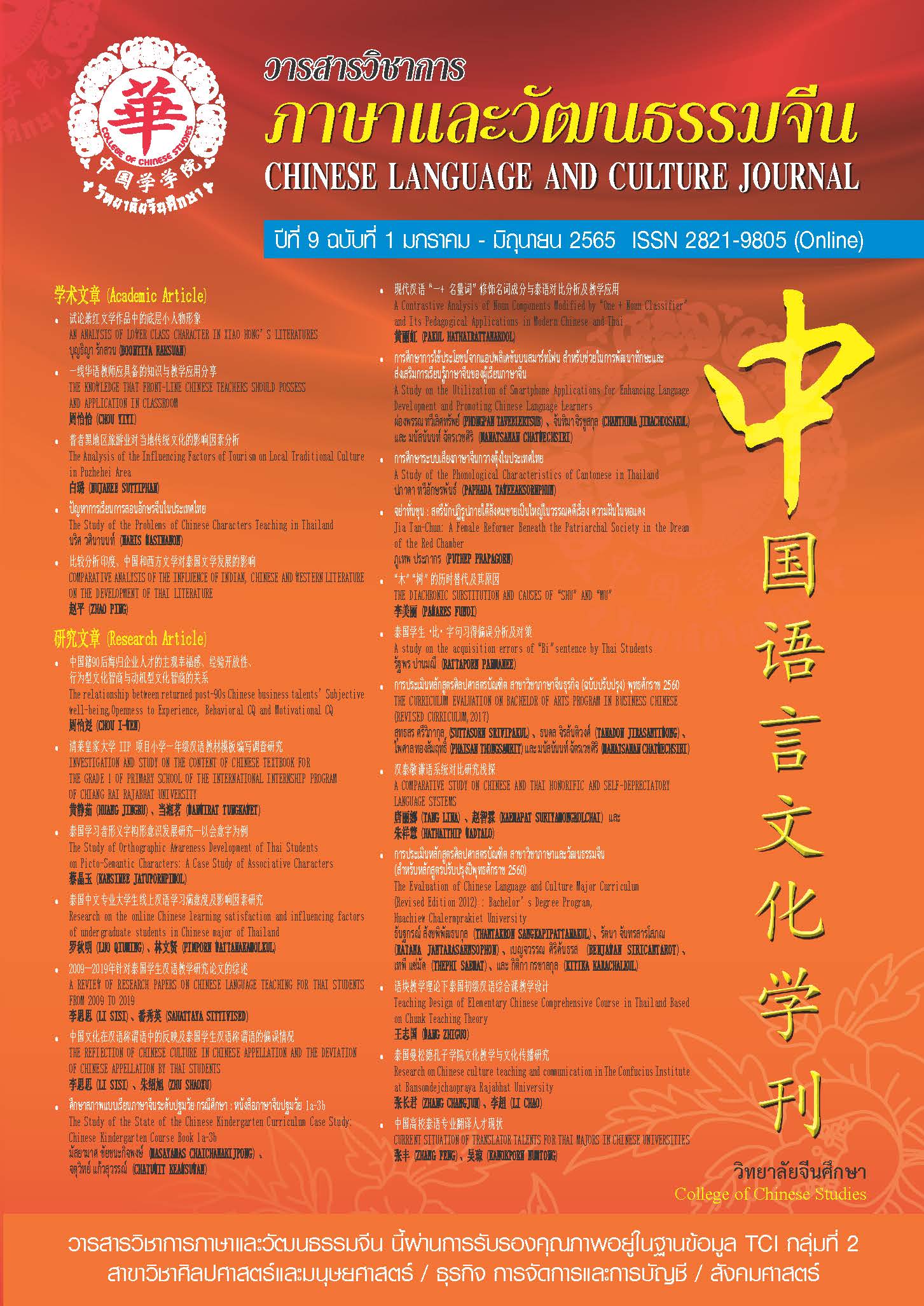中国籍90后海归企业人才的主观幸福感、经验开放性、行为型文化智商与动机型文化智商的关系
The relationship between returned post-90s Chinese business talents' Subjective well-being, Openness to Experience, Behavioral CQ and Motivational CQ
Keywords:
Openness to experience, Motivational CQ, Chinese returned talents, Subjective well- beingAbstract
It is crucial to foster Cultural Intelligence within the human resource management of a global organization. However, there are no scholars in Thailand to explore the relationship between Openness of Experience, CQ, and SWB of Chinese return business talents. Therefore, this study aims to explore these four variables and give a reference for the Chinese government and human resource department to do the strategy of retaining overseas returnees. This study distributed a questionnaire to 103 Chinese corporate employees who have finished studying and returned from Thailand. The Model 6 of SPSS 25.0 and Process 3.5 was used to conduct the statistical analysis.
The results came out: 1. Motivational CQ has partial mediating effect on the relationship between openness to experience and subjective well-being; 2. Motivational CQ and Subjective well-being is significantly positively correlated to each other ; 3. Openness to experience is significantly positively correlated to subjective well-being ; 4. Openness to experience has a significant positive impact on motivational cultural intelligence ; 5. Behavioral cultural intelligence has no mediating effect on the relationship between openness to experience and subjective well-being. 6. Behavioral cultural intelligence and motivational cultural intelligence have no mediating effects of the relationship between the openness to experience and subjective well-being.
References
Ang, S., Van Dyne, L., & Koh, C. (2006). Personality correlates of the four-factor model of cultural intelligence. Group & organization management, 31(1), 100-123.
Ang, S., Van Dyne, L., Koh, C., & Ng, K. (2004). The measurement of cultural intelligence. Paper presented at the academy of management meetings symposium on cultural intelligence in the 21st century, New Orleans, LA.
Ang, S., Van Dyne, L., Koh, C., Ng, K. Y., Templer, K. J., Tay, C., & Chandrasekar, N. A. (2007). Cultural intelligence: Its measurement and effects on cultural judgment and decision making, cultural adaptation and task performance. Management and organization review, 3(3), 335-371.
Anglim, J., & Horwood, S. (2020). Effect of the COVID-19 Pandemic and Big Five Personality on Subjective and Psychological Well-Being. Social Psychological and Personality Science, 1948550620983047.
Carnevale, J. B., & Hatak, I. (2020). Employee adjustment and well-being in the era of COVID-19: Implications for human resource management. Journal of Business Research, 116, 183-187.
Chou, I.-W. (2020). The Effect Of Behavioral Cultural Intelligence, personality, And Academic Performance On Perceived well-being Among International Chinese College students In Thailand. Chinese Journal of Social Science and Management, 4(2), 126-136.
Chou, I.-W. (2021). Thai-Chinese Cultural Differences: An Empirical Study on How Cultural Intelligence and Gender May Affect the Subjective Well-Being of Chinese Students Enrolled at Thai Universities. AJMI-ASEAN Journal of Management and Innovation, 8(1), 98-116.
Costa Jr, P. T., McCrae, R. R., & Kay, G. G. (1995). Persons, places, and personality: Career assessment using the Revised NEO Personality Inventory. Journal of Career Assessment, 3(2), 123-139.
Costa, P. T., & McCrae, R. R. (1992). Normal personality assessment in clinical practice: The NEO Personality Inventory. Psychological assessment, 4(1), 5.
Earley, P. C., & Ang, S. (2003). Cultural intelligence: Individual interactions across cultures
Earley, P. C., & Mosakowski, E. (2004). Cultural intelligence. Harvard business review, 82(10), 139-146.
Fornell, C., & Larcker, D. F. (1981). Evaluating structural equation models with unobservable variables and measurement error. Journal of marketing research, 18(1), 39-50.
Gooden, D. J., Creque, C. A., & Chin-Loy, C. (2017). The impact of metacognitive, cognitive and motivational cultural intelligence on behavioral cultural intelligence. International Business & Economics Research Journal (IBER), 16(3), 223-230.
Guilford, J. (1959). Personality McGraw-Hill book Company. Inc: New York.
Hayes, A. F. (2017). Introduction to mediation, moderation, and conditional process analysis: A regression-based approach: Guilford publications.
Hunter, J. E., & Schmidt, F. L. (2000). Fixed effects vs. random effects meta‐analysis models: Implications for cumulative research knowledge. International Journal of selection and assessment, 8(4), 275-292.
Kaiser, H. F. (1974). An index of factorial simplicity. Psychometrika, 39(1), 31-36.
Lu, L., & Lin, Y. (2003). Academic achievement and self-concept: Chinese and Japanese adolescents. Fu Jen Studies: Science and Engineering, 37(1), 43-62.
Morizot, J. (2014). Construct validity of adolescents’ self-reported big five personality traits: Importance of conceptual breadth and initial validation of a short measure.
Assessment, 21(5), 580-606.
Pervin, L. A., Cervone, D., & John, O. P. (2005). Persönlichkeitstheorien: Reinhardt München. Schimmack, U. (2008). The structure of subjective well-being. The science of subjective well-being, 54, 97-123.
Shen, T. Y. (2003). Validity of the Five-Factor Model of Personality in Predicting Sales Performance of Life Insurance Salespeople: Cross-cultural Inspection of the NEO-PI-R and Empirical Exploration of Interpersonal Traits. ((Unpublished doctoral dissertation)). Chiao Tung University R.O.C.
Teng, C., Tseng, H., Li, I., & Yu, C. (2011). International English Big-Five mini-markers: Development of the traditional Chinese version. Journal of Management, 28(6), 579-600.
Downloads
Published
How to Cite
Issue
Section
License
Copyright (c) 2022 Journal of Chinese Language and Culture, Huachiew Chalermprakiet University

This work is licensed under a Creative Commons Attribution-NonCommercial-NoDerivatives 4.0 International License.
บทความที่ได้รับการตีพิมพ์เป็นลิขสิทธิ์ของวารสารภาษาและวัฒนธรรมจีน มหาวิทยาลัยหัวเฉียวเฉลิมพระเกียรติ
บทความใน “วารสารวิชาการภาษาและวัฒนธรรมจีน” เป็นทรรศนะของผู้เขียนโดยเฉพาะ กองบรรณาธิการไม่มีส่วนในความคิดเห็นในข้อเขียนเหล่านั้น




